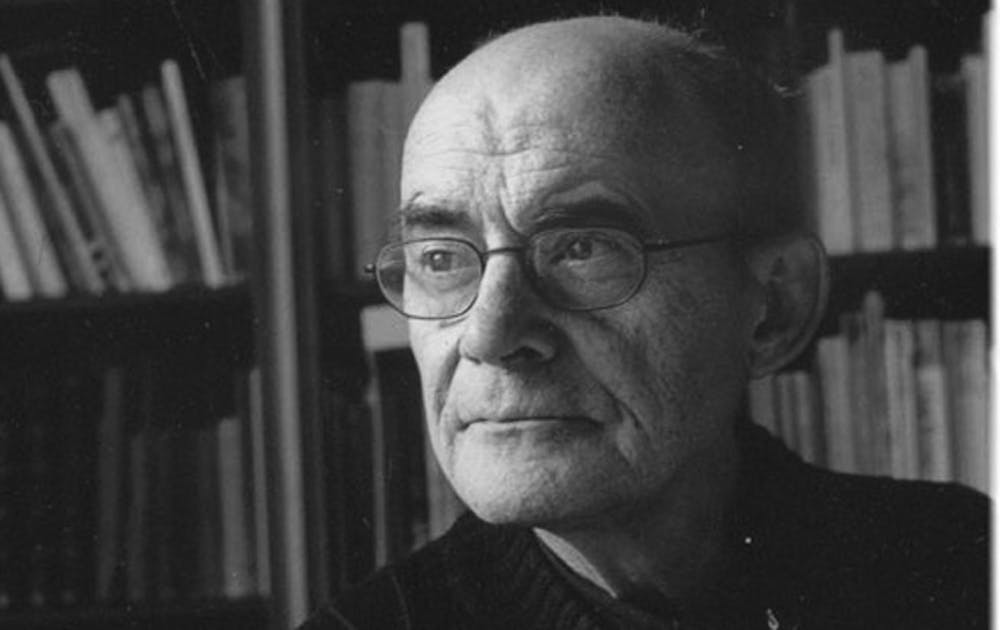At first glance, the disciplines of philosophy and music appear to have little in common. Whereas philosophers strive to create clear arguments using definable concepts, musicians compose melodies and symphonies that resist linguistic understanding. Whereas philosophy is hyper-verbal, music is predominantly non-verbal. When commenting on music, philosophers often speak in roundabout or simplistic ways (e.g. Schopenhauer once wrote that “music is the answer to the mystery of life”). Likewise, many composers explicitly allude to philosophical texts—e.g. Richard Strauss’ Also Sprach Zarathustra—but few musicians would say that their philosophy-inspired compositions have added to the substantive philosophical arguments or discussions surrounding the thinker’s work. Despite these difficulties, philosophers and musicians have long studied each other’s disciplines for both inspiration and new understanding.
At Duke this week an event series called “7 Words” showcases a philosopher, Jean-Luc Nancy, and a composer, Olivier Dejours, who have worked together to create spaces in which music and philosophy can resonate. The two Frenchmen have collaborated on an arrangement of music and spoken word that was premiered on Tuesday evening by the Galuppi Ensemble in the Duke Memorial Chapel. The piece, Seven Words, is a melodrama according to the classical music’s sense of the word: a work that combines performed music with non-sung speech. The instrumental portion of the performance combines sections from Joseph Haydn’s “Seven Last Words of Christ” with sections of contemporary music—composed by Dejours—interposed with Haydn’s piece. Spoken over the modern segments are words from a philosophical-poetic text—written by Nancy—that evokes the last seven phrases Christ voiced in the gospels.
The chosen form complicates the boundaries of music and philosophy. “Melodrama is a very specific hybrid genre that mixes something purely musical—the instrumental sections—with something that is not [typically considered] musical: spoken language,” said Jacqueline Waeber, a musicologist and an associate professor of music at Duke. Because it mixes music and speech, it’s not hard to imagine how the concept of the melodrama would provoke questions from the philosopher of art: has Nancy’s text become musical by virtue of its backdrop? Does the text harmonize with the music and in what ways?
The other two events in the series continue lines of questioning from Tuesday’s performance. On Thursday, Nancy will speak with Duke faculty, students and guests via teleconference on subjects such how a philosopher might best approach writing about music, especially religious music. Nancy is in a unique position to comment on religious music: he is a regular collaborator with musicians—beyond his work on Seven Words, he has worked on pieces with musicians Marc André and Michael Levinas—and he has written entire texts on the study of music including his meditation on the sound and timbre of music entitled L’écoute (in English: Listening). Nancy’s relationship with artists does not stop with musicians: he has worked on a project with choreographer Mathilde Monnier, and his autobiography provided inspiration for experimental filmmaker Claire Denis’s 2004 full-length feature L’intrus (The Intruder). Nancy is also a former theologian, and he has been heavily influenced by a tradition of French and German philosophers—especially Nietzsche, Heidegger, Blanchot and Derrida—who all wrote regularly about music and problems in aesthetics. “He’s one of those rare philosophers who thinks artists can say things that are meaningful about their own work and helps make their work palpable,” said Anne-Gaëlle Saliot, an assistant professor of French Studies who is the brainchild behind the “7 Words” series.
Few philosophers in the United States would be willing to talk about music as a significant method to approach contemporary philosophical problems. In general, U.S. philosophers tend to dismiss artistic disciplines in favor of more logical and epistemologically rigorous methods of understanding. (Case in point: looking through the multitude of sponsors listed on the “7 Words” website, the most striking absence is Duke’s Philosophy Department, though Saliot said she contacted them early in the process of planning the series.) It’s not the only difference between the ways philosophy is practiced in the U.S. and France. French philosophers are often much more directly involved in social discourse (e.g. Nancy has written pamphlets against some of former-President Sarkozy’s political decisions). Nancy also gives conferences on philosophy tailored especially for children, something that, to my knowledge, doesn’t happen in the States.
“He can actually talk to ten-year-olds and make them understand what it means to die,” Saliot said. “I’ve seen him do it.”
The event series concludes with a symposium that will take place from 2-5 p.m. on Friday in the Smith Warehouse. The panel is composed of two philosophy professors—François Noudelmann from the European Graduate School and Richard Fleming from Bucknell University—as well as the aforementioned Jacqueline Waeber and Olivier Dejours. The discussions will center on the role that music plays in contemporary questions in aesthetics, though each of the speakers will likely talk about their own particular area of expertise.
“7 Words” is one of countless interdisciplinary arts ventures that have happened on Duke’s campus over the past few years. The project stands out in part because of the involvement of one of France’s seminal philosophers and because the series discusses two disciplines that, at least in the United States, are only rarely and controversially bridged.
Jean-Luc Nancy will present a lecture via teleconference that can be viewed in the FHI Garage in Bay 4 of Smith Warehouse on Thursday, January 31. Friday’s symposium also takes place in the FHI Garage and will run from 2-5 p.m.
Get The Chronicle straight to your inbox
Signup for our weekly newsletter. Cancel at any time.

